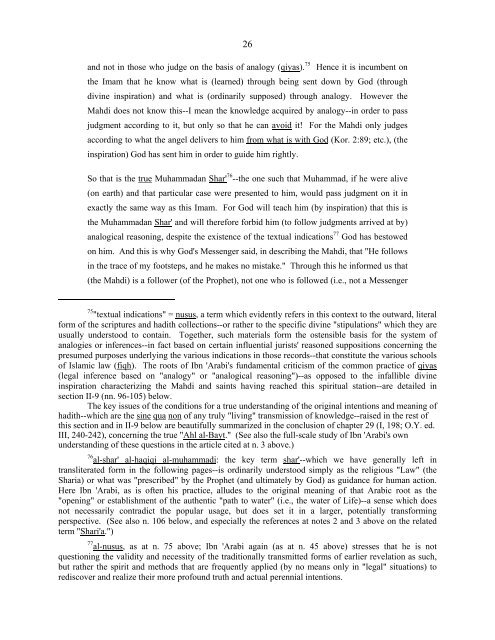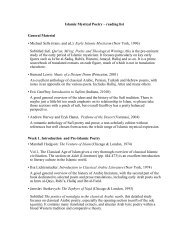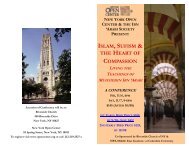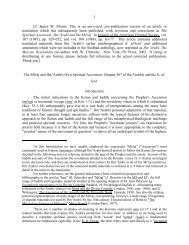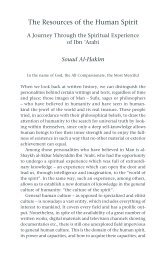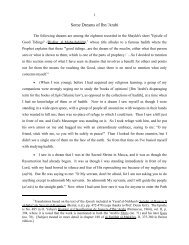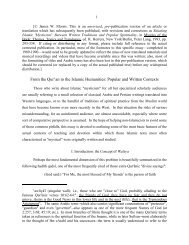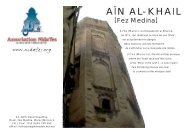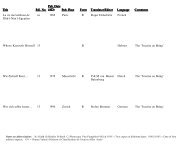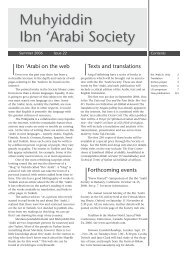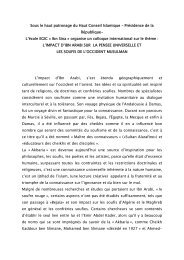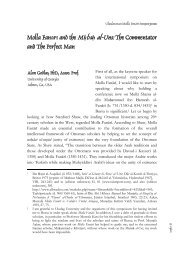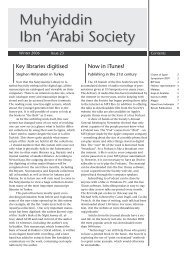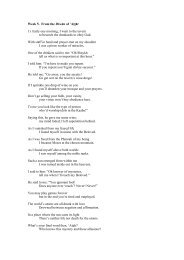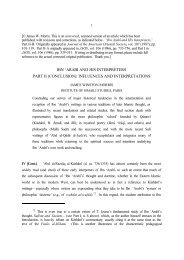The Mahdi and His Helpers - Muhyiddin Ibn Arabi Society
The Mahdi and His Helpers - Muhyiddin Ibn Arabi Society
The Mahdi and His Helpers - Muhyiddin Ibn Arabi Society
You also want an ePaper? Increase the reach of your titles
YUMPU automatically turns print PDFs into web optimized ePapers that Google loves.
26<strong>and</strong> not in those who judge on the basis of analogy (qiyas). 75 Hence it is incumbent onthe Imam that he know what is (learned) through being sent down by God (throughdivine inspiration) <strong>and</strong> what is (ordinarily supposed) through analogy. However the<strong>Mahdi</strong> does not know this--I mean the knowledge acquired by analogy--in order to passjudgment according to it, but only so that he can avoid it! For the <strong>Mahdi</strong> only judgesaccording to what the angel delivers to him from what is with God (Kor. 2:89; etc.), (theinspiration) God has sent him in order to guide him rightly.So that is the true Muhammadan Shar' 76 --the one such that Muhammad, if he were alive(on earth) <strong>and</strong> that particular case were presented to him, would pass judgment on it inexactly the same way as this Imam. For God will teach him (by inspiration) that this isthe Muhammadan Shar' <strong>and</strong> will therefore forbid him (to follow judgments arrived at by)analogical reasoning, despite the existence of the textual indications 77 God has bestowedon him. And this is why God's Messenger said, in describing the <strong>Mahdi</strong>, that "He followsin the trace of my footsteps, <strong>and</strong> he makes no mistake." Through this he informed us that(the <strong>Mahdi</strong>) is a follower (of the Prophet), not one who is followed (i.e., not a Messenger75 "textual indications" = nusus, a term which evidently refers in this context to the outward, literalform of the scriptures <strong>and</strong> hadith collections--or rather to the specific divine "stipulations" which they areusually understood to contain. Together, such materials form the ostensible basis for the system ofanalogies or inferences--in fact based on certain influential jurists' reasoned suppositions concerning thepresumed purposes underlying the various indications in those records--that constitute the various schoolsof Islamic law (fiqh). <strong>The</strong> roots of <strong>Ibn</strong> '<strong>Arabi</strong>'s fundamental criticism of the common practice of qiyas(legal inference based on "analogy" or "analogical reasoning")--as opposed to the infallible divineinspiration characterizing the <strong>Mahdi</strong> <strong>and</strong> saints having reached this spiritual station--are detailed insection II-9 (nn. 96-105) below.<strong>The</strong> key issues of the conditions for a true underst<strong>and</strong>ing of the original intentions <strong>and</strong> meaning ofhadith--which are the sine qua non of any truly "living" transmission of knowledge--raised in the rest ofthis section <strong>and</strong> in II-9 below are beautifully summarized in the conclusion of chapter 29 (I, 198; O.Y. ed.III, 240-242), concerning the true "Ahl al-Bayt." (See also the full-scale study of <strong>Ibn</strong> '<strong>Arabi</strong>'s ownunderst<strong>and</strong>ing of these questions in the article cited at n. 3 above.)76 al-shar' al-haqiqi al-muhammadi: the key term shar'--which we have generally left intransliterated form in the following pages--is ordinarily understood simply as the religious "Law" (theSharia) or what was "prescribed" by the Prophet (<strong>and</strong> ultimately by God) as guidance for human action.Here <strong>Ibn</strong> '<strong>Arabi</strong>, as is often his practice, alludes to the original meaning of that <strong>Arabi</strong>c root as the"opening" or establishment of the authentic "path to water" (i.e., the water of Life)--a sense which doesnot necessarily contradict the popular usage, but does set it in a larger, potentially transformingperspective. (See also n. 106 below, <strong>and</strong> especially the references at notes 2 <strong>and</strong> 3 above on the relatedterm "Shari'a.")77 al-nusus, as at n. 75 above; <strong>Ibn</strong> '<strong>Arabi</strong> again (as at n. 45 above) stresses that he is notquestioning the validity <strong>and</strong> necessity of the traditionally transmitted forms of earlier revelation as such,but rather the spirit <strong>and</strong> methods that are frequently applied (by no means only in "legal" situations) torediscover <strong>and</strong> realize their more profound truth <strong>and</strong> actual perennial intentions.


